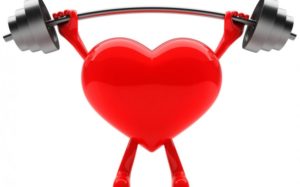
Regular Exercise
Being physically active is a huge part of heart health. Exercising 3-4 times a week, at an average of 40 minutes, will make all the difference. Physical activities that switch back and forth in intensity and interval, like HIIT (High Intensity Interval Training) are great but even walking ten minutes more a day is a good way to get started.
Control Your Weight
For guys, a waistline of 40 inches is an indicator of a possible health problem. Visceral abdominal fat—the kind that’s deeply embedded under the skin—is especially dangerous. To combat this, we recommend a diet based in leafy greens and good fats that’s low in wheat and excess sugar. Keeping active is also important, and we’re not just talking exercise—if you’re sedentary at work, it’s time to take more get up and move breaks.
Schedule an Adjustment
One of the best all-natural ways of combating health disease is regular visits to the chiropractor. The University of Chicago Hypertension Center performed a study involving 50 individuals and found that after just one chiropractic adjustment to a misaligned atlas bone (a vertebra that helps support the head), patients experienced a significant decrease in blood pressure.
Manage Your Stress
The effects of stress on the body and mind are very real. It’s been suggested that stress triggers inflammation, an instigator of heart disease. And some of the more common behaviors caused by stress—over-eating, inactivity, smoking—don’t do your heart any beneficial favors. Manage your stress by staying positive and finding ways of stress relief that work for you like yoga, meditation, exercise or even just taking a few minutes from the day to yourself.
Monitor Cholesterol and Blood Pressure
When too much LDL (bad cholesterol) builds up, it can create a thick deposit that clogs arteries and makes them less flexible. For men, the numbers to strive for are HDL (good cholesterol) levels of 40mg or higher and LDL levels below 100. In turn, high blood pressure damages your circulatory system, and is known as the “silent killer”—a huge contributing factor to heart attack and stroke. Normal blood pressure is below 120/80. If you’re suffering from either of these conditions, consult with your physician to assess a proper method of care.



Leave A Comment
You must be logged in to post a comment.